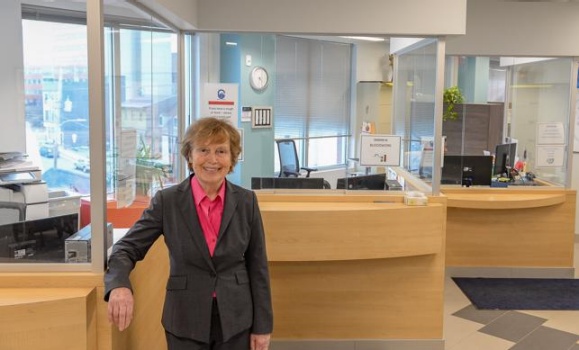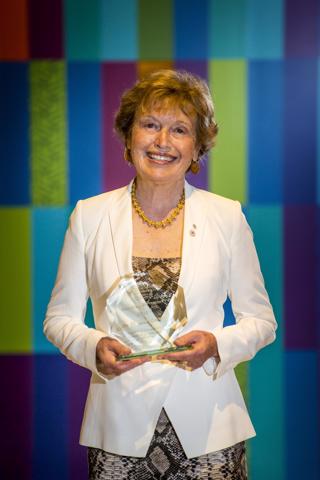» Go to news main
Dr. Margaret Casey: a crusader for community‑based health care

A waiting room with a sofa; a bathroom; an examining room. That was the entire North End Clinic when Dr. Margaret Casey first crossed the threshold in 1972. In those three rooms, in a modest building on Halifax’s Gottingen Street, Dr. Casey and her colleagues were preparing the ground for a new paradigm in health care. The germ of the idea came from the community itself.
“Up until then, the only access to medical care for people in the North End of Halifax was through the Victoria General outpatient clinics,” explains Dr. Casey. “Several women in the community got together and approached the Halifax Medical Society and, with their help, the small clinic was started.”
Dr. Casey lived in Halifax during the Second World War but grew up in Toronto. She returned to Halifax in 1963 to go to Dalhousie, having decided to follow her father and grandfather, both Nova Scotians, into medicine.
She encountered a very different medical school than the institution we know today. “The demographic of the medical students was very different, mostly men and almost no diversity,” she remembers. “And there wasn’t the emphasis on the social circumstances and cultural backgrounds of the patients that we see today.”
Dr. Casey chose the path of general practice and spent three years working with family doctors in the Halifax area. Then word reached her about a new kind of health clinic in the North End, which is how she came to be standing in those three rooms in 1972.
“What it really introduced me to—although the term wasn’t being used then—was the social determinants of health and what an absolutely massive impact they have on people’s health,” she recalls. “And of course, the big question is, as a physician, how do you try and address those?”
The idea of social determinants in health stems from an uncomfortable truth: although we like to believe in equality, the world is not truly equal. Circumstances give some of us access to better food, better housing, and more opportunities to build successful, healthy lives. Simply put, while disease comes for rich and poor alike, it takes a significantly heavier toll on the poor.
Dr. Donna Curry, a colleague of Dr. Casey’s and a fellow Dalhousie graduate, believes it took special people to build an institution like the North End Clinic.
“Dr. Casey has the compassion and empathy to be very vital when dealing with the less fortunate, which so many of these patients are. She has a missionary zeal to her, and that is the way she practices,” says Dr. Curry. “So much good work is done under that one roof to make patients more comfortable and to encourage them to participate in their own health care.”
Under the leadership of Johanna Oosterveld, the executive director at the time, the North End Clinic began adding programs and people, moving into a new building when its people and programs expanded beyond what three rooms would support. These included a dietitian to help families eat well on a tight budget and social workers to help them navigate government programs. There was also a nurse-run and staffed outreach van to provide mobile care to homeless people, who Dr. Casey says are vulnerable and often neglected.
 Dr. Casey left the clinic in 1997. In 2004, she was named a Member of the Order of Canada for her quarter century of service to the community, which has also included volunteering in clinics in St. Lucia and Haiti and locally with such organizations as the United Way, the Children’s Aid Society and the Home of the Guardian Angel.
Dr. Casey left the clinic in 1997. In 2004, she was named a Member of the Order of Canada for her quarter century of service to the community, which has also included volunteering in clinics in St. Lucia and Haiti and locally with such organizations as the United Way, the Children’s Aid Society and the Home of the Guardian Angel.
She returned to the clinic—now known as the North End Community Health Centre—as board chair in 2008. She remains involved through various committees.
This year, in partnership with government, and after four years of advocacy from current executive director Dr. Rod Wilson, the North End Community Health Centre has moved into a new building, still on Gottingen Street. Dr. Casey could never have imagined a facility like this back in 1972.
“All of us find it absolutely unbelievable to have this much space, which also includes a dental clinic in collaboration with the Dalhousie Faculty of Dentistry,” she says. “The new space is beautifully set up. Everybody is so delighted with this. It gives them a sense that their community is worth this great space. It’s a statement that their health is of huge importance.”
Dalhousie has been a constant in Dr. Casey’s life throughout her North End Clinic years and beyond. For example, she mentored medical students and residents at the clinic, helping them see and appreciate the complex struggles of people living on the margins. And, she credits the connections she made at the medical school with helping her link patients to specialist care.
She is well known by Dalhousie medical alumni from the six years she spent as the medical school’s director of admissions; later, she served as president of the Dalhousie Medical Alumni Association.
Although medicine is complicated, Dr. Casey is animated by a simple guiding principle:
“We’re very privileged to have the opportunity to provide care to people. I think we have an obligation not only to provide the best care but to support and to advocate for care that addresses the social determinants of health. Otherwise we’re not going to move very far ahead.”
Photos by Jollymore Photos.
Recent News
- Dal’s 2025 research awards
- Six accomplished individuals honoured as notable Dal alumni
- New hope for for Fabry patients
- New associate dean, UGME, Dr. Ian Epstein’s vision for medical education
- 2025 Picchione Symposium Confronts the Crisis in Maternal and Infant Health
- Dalhousie Medicine Opens Class of 2000 Time Capsule
- Partnership prompts 'I can be a doctor here' moments
- An order of magnitude: Ford Doolittle named Companion of the Order of Canada
